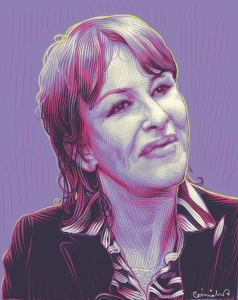Pacific Standard
By Lucia Graves
Hakima El Haité, host of COP22 in Marrakech, is a pioneer for women — in science and diplomacy, and above all in the struggle for climate justice.
Hakima El Haité is Morocco’s minister for the environment and host of COP22. (Illustration: Piotr Lesniak)
“I’m the most hated minister in the world,” Morocco’s environmental minister Hakima El Haité says with a laugh. “All the ministers of environment are hated you know? Because the ministers of environment are not very important in terms of protocol, but they are controlling everybody.”
El Haité is currently one up on her colleagues: They’re meeting in Marrakech, on her home turf. It’s November 18th, 2016, the last day of COP22, the annual United Nations climate summit, without a doubt the highest-profile event of her career, and spirits are running reasonably high, despite grim news out of America’s presidential election. What’s more, it’s clear that El Haité is well suited to her role.
Most environmental ministers are far more comfortable wearing their scientist hat, rather than that of statesman or spokesman. (Imagine the head of the Environmental Protection Agency orchestrating diplomatic talks on the world stage). But for two weeks each year, in whatever country has agreed to host climate talks, these scientists must double as the world’s top diplomats — and, in El Haité’s case, as a gracious host.
“Let it be clear, the fight for gender equality is not a matter of feminism, it is a societal matter.”
That she happens to be a woman in a Muslim country marks El Haité’s rise as all the more extraordinary, especially given that her qualifications set her apart in concentric male-dominated circles: She is a high-level Moroccan official; a doctor of science; a leader in the Arab world; and, now, chief overseer of global climate talks.
At 53, El Haité certainly has the bona fides to justify her impressively varied roles, both in the science-heavy realm of environmental policy and in the bluster-heavy one of international leadership. Born in Fes, she got her undergraduate degree in biology and microbiology from Sidi Mohamed Ben Abdellah University, also in Fes. But she didn’t stay there.
Instead, El Haité west to the United States, where she earned a degree in political communication in 2008, and then to France, where she completed a Ph.D. in environmental engineering from the École nationale supérieure des mines at Saint-Étienne, in 2010. Along the way, she held leadership roles in a number of organizations benefiting civil society, among them the Moroccan Association of Women Entrepreneurs and the International Network of Liberal Women, where she currently serves as vice president.
This story appears in the March/April 2017 issue of Pacific Standard.
Given a particularly difficult COP this past year, and especially one haunted by the specter of Donald Trump’s surprise victory, El Haité’s impressive background has stood her in good stead. In the overeducated, polyglot-elite bubble of the climate talks, it helps, for instance, that she’s trilingual: She can fend off questions about Trump in English, Arabic, or French.
But addressing audiences under the sloping white tents of COP22, El Haité appears to prefer the latter, slipping into English only at the behest of the occasional less linguistically accomplished reporter. “We should open the door for dialogue with the administration of the president,” she says of Trump in a characteristically diplomatic aside. “We have heard the candidate. Today we have to listen to the president. So we need more dialogue.”
Another area where more dialogue is needed, she says, is with women worldwide, and with women leaders especially. El Haité’s own advocacy around women and leadership is highly relevant at the Marrakech talks, where, despite a recent uptick in female representation among some of the COPs most visible roles, women still comprise a woefully small percentage of delegation heads — around one-third.
As El Haité explains in the final days of COP, as part of the Women Leaders and Global Transformation Summit in Marrakech, her views are less about women’s empowerment than good politics. “Who, other than us, mothers and grandmothers, understand better the challenges of providing food, water, and security to our children?” she asks her audience. “Let it be clear, the fight for gender equality is not a matter of feminism, it is a societal matter.”
In other words, in seeking climate solutions, we must incorporate the perspective and insights of women, or perish. It’s that simple — and that infinitely complex.
Yet, ever the politician, in private asides she repeatedly redirects all questions, seeking to talk up the success of her home country’s talks — in whatever language the moment requires.
On the last night of the Marrakech talks, long after the sky has gone black, she wants to explain to whatever reporters are still on the premises what she sees as the successful work of this year’s negotiation, and to remind us that the Marrakech talks, as with the Paris talks before them, were never really a destination; like the long red lines laid down by protesters along the Champs-Élysées following the signing of the 2015 agreement, they’re merely markers on the path forward.
As for the importance of having women in leadership at climate talks? As the rare female minister in a Muslim country, El Haité would rather talk about her job. “I really can’t tell you,” she says with a smile when I raise the subject. Pinching my cheeks, she shrugs in feigned helplessness as a coterie of staffers sweeps her out the doors of the half-abandoned media tent and into the night.









